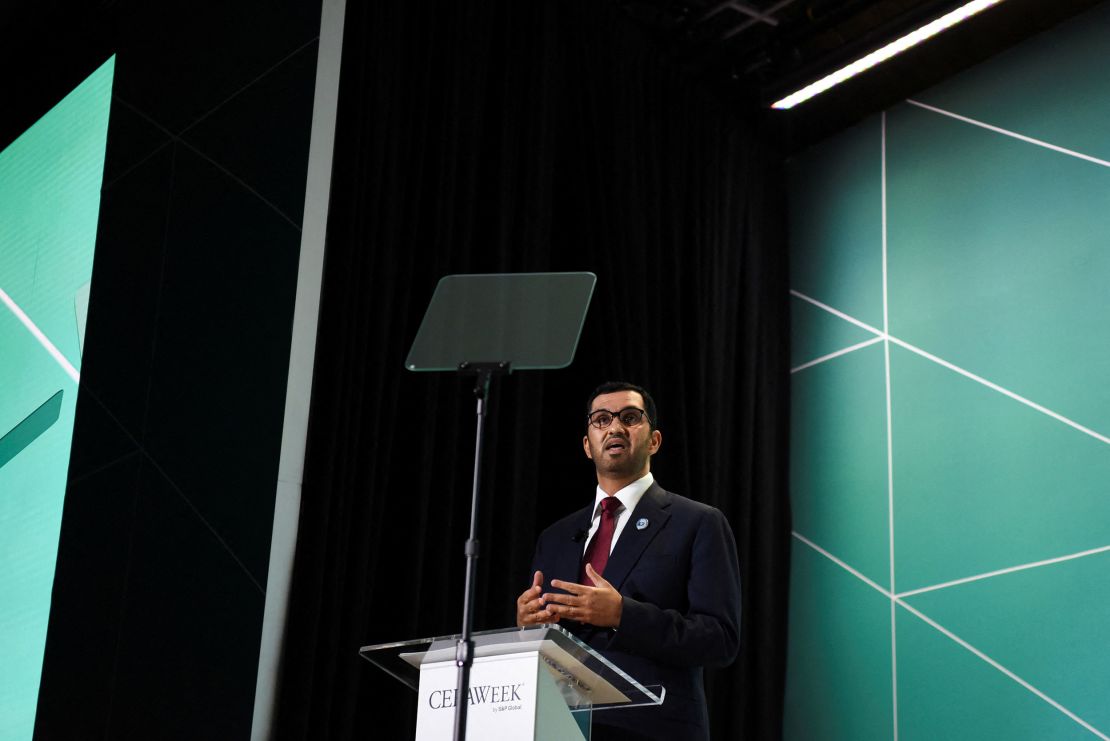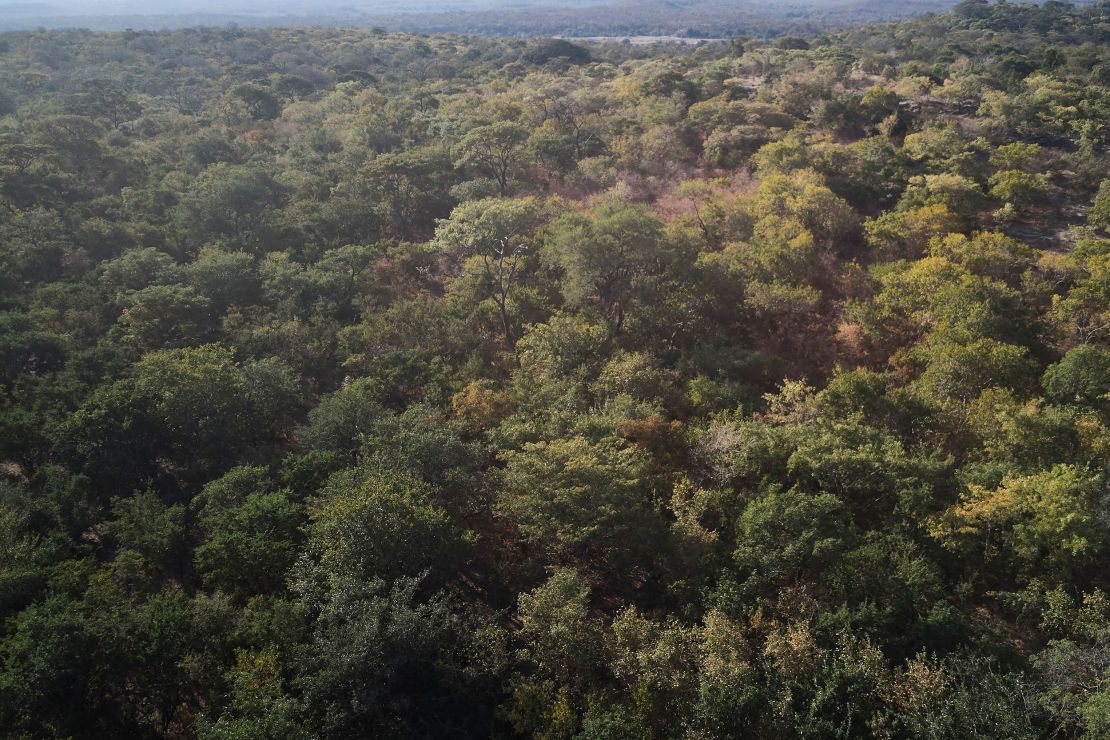A UAE company has secured African land the size of the UK for controversial carbon offset projects
Cracking towers stand at the Ruwais refinery and petrochemical complex, operated by Abu Dhabi National Oil Co. (ADNOC), in Al Ruwais, United Arab Emirates.
In late September, Zimbabwe’s environment minister signed away control over a staggering amount of land — almost 20% of his country — to a little-known foreign company. Blue Carbon was a small, new outfit, not even a year old, but its chief was no fledgling entrepreneur: he was an Emirati royal whose family had ruled Dubai for 190 years, flush with oil money.
The Dubai-based Blue Carbon has secured forested land nearly equivalent to the size of the United Kingdom across five African nations to run projects to conserve forests that might otherwise be logged, preventing huge amounts of planet-heating carbon dioxide, or CO2, from entering the atmosphere.
Blue Carbon can then use that conservation to create carbon credits to sell to companies and governments to “offset” the climate pollution they generate while they continue to burn planet-warming fossil fuels.
The flurry of forest conservation deals with Zimbabwe, Zambia, Kenya, Liberia and Tanzania were announced in the months ahead of the annual United Nations’ COP28 climate summit, being hosted this year in December by the United Arab Emirates. But according to several analysts and climate advocates CNN spoke with for this story, these conservation deals are the latest attempt by the petrostate to use green initiatives as a smokescreen for its plans to continue pumping fossil fuels.
At the same time, the UAE has said it plans to extract its very last barrel of oil 50 years from now, when its reserves are projected to dry up — decades beyond when scientists say society needs to be done with fossil fuel.
A spokesperson would not confirm to CNN that the company would sell those credits to the UAE, but given Blue Carbon’s chairman, Sheikh Ahmed Dalmook Al Maktoum, is a relative of Dubai’s royal ruler — who also serves as the UAE’s prime minister — the widely held assumption among analysts CNN spoke with is that these credits will be sold to the UAE to offset its enormous carbon footprint. They could also be sold to other oil-reliant nations and companies in the Gulf and beyond. CNN has reached out to the UAE government for comment.
Blue Carbon would not confirm to CNN the area size of all its projects, how much money it has provided in financing or how many credits it hopes to generate. The agreements are in initial stages and not yet finalized.
But the company did tell CNN it would present its deals at the COP28 summit in Dubai as a “blueprint” for carbon trading. The annual climate summit is where global leaders and negotiators from nearly 200 countries will convene to decide how and when to ramp down fossil fuel use. The UAE is expected to use its COP28 presidency to push hard to include carbon removal — not just from forests, but also from oil and gas as they burn and then storing it underground — central solution to the climate crisis.
Climate advocates have criticized carbon removal — and scientists remain skeptical of its efficacy — as a ticket for companies to continue to produce and burn fossil fuels on a large scale, even expand, and profit handsomely.
The UAE has a lot to lose, financially. Oil and gas account for around 30% of its GDP and 13% of its exports as of last year, according to the US Department of Commerce. More than 80 countries support phasing out fossil fuels, and renewable energy, like wind and solar, are now so cost competitive in most parts of the world that market forces will eventually squeeze oil and gas out anyway.
Unless, that is, fossil fuel companies and lobbyists can convince the world at COP28 not to rely too much on wind and solar, and to keep pumping oil and gas.
The UAE has already been hit with a barrage of criticism since it put Sultan Al Jaber — who runs the nation’s mammoth oil and gas company, the Abu Dhabi National Oil Company (ADNOC), and serves as the nation’s international climate envoy — in charge of the negotiations. More than 100 members of the US Congress and the European Parliament in May called for Al Jaber to be replaced as COP28 president.
Al Jaber sees no conflict of interest in his many roles, he has said in multiple interviews. Nor does ADNOC, which told CNN in an email that there was “no one more qualified,” to lead the negotiations, pointing to his experience as leader of the nation’s renewable energy vehicle, Masdar, as well as its fossil fuels oil and gas company.

The production boost contrasts with plans among other oil majors: Shell’s production is projected to remain largely flat in that time, while BP envisions a 25-percent production cut by 2030. ADNOC, by 2030, plans to out-produce both companies.
ADNOC is starting to look like a new international oil major in other ways, too: It’s expanding its portfolio by buying up assets overseas, such as a gas fields in Azerbaijan, and it has teamed up with BP in a bid to buy a 50% stake in Israel’s NewMed Energy, with a focus on gas exploration in areas including the eastern Mediterranean. It is also buying into projects around renewables and chemicals, the company told CNN.
To limit its carbon footprint amid the expansion, ADNOC said in October it plans to capture 10 million metric tons of CO2 a year from its operations by 2030 — a figure Global Witness found was wildly exaggerated in a recent analysis.
ADNOC currently has the capacity for 800,000 metric tons per year, though it hopes to capture another roughly 3 megatons per year through two facilities not yet completed. Even if those facilities do come online, Global Witness calculates it would take ADNOC more than 340 years to capture the amount of planet-heating carbon it is expected to emit between 2023 and 2030, if it captured both the emissions from its operations and those that occur from using its oil and gas.
ADNOC did not address the calculation in its response to CNN, saying only that it had set its ambition “to achieve net zero by 2045 backed by an initial $15 billion allocation.”
“Before this year, most people would have been forgiven for never having heard of ADNOC. The more we learn about this company — whose CEO remember is charged with making meaningful progress on emissions reductions at COP28 — the greater an outlier it becomes,” Patrick Galey, a senior fossil fuels investigator at Global Witness, told CNN.
“ADNOC plans not only to produce billions of barrels of oil for decades to come, but it is also positioning itself to be among the most aggressive expanders of oil and gas production out there.”
How much the UAE company expands beyond 2030 will depend on what role negotiators see for carbon capture at COP28, and whether it can find new markets abroad. Ironically, COP28 could be the arena that transforms ADNOC into a global oil major.
This story has been updated to reflect that South Pole has denied allegations it overstated the value of its carbon credits, and to include a statement from a South Pole spokesperson on why its CEO stepped down.


